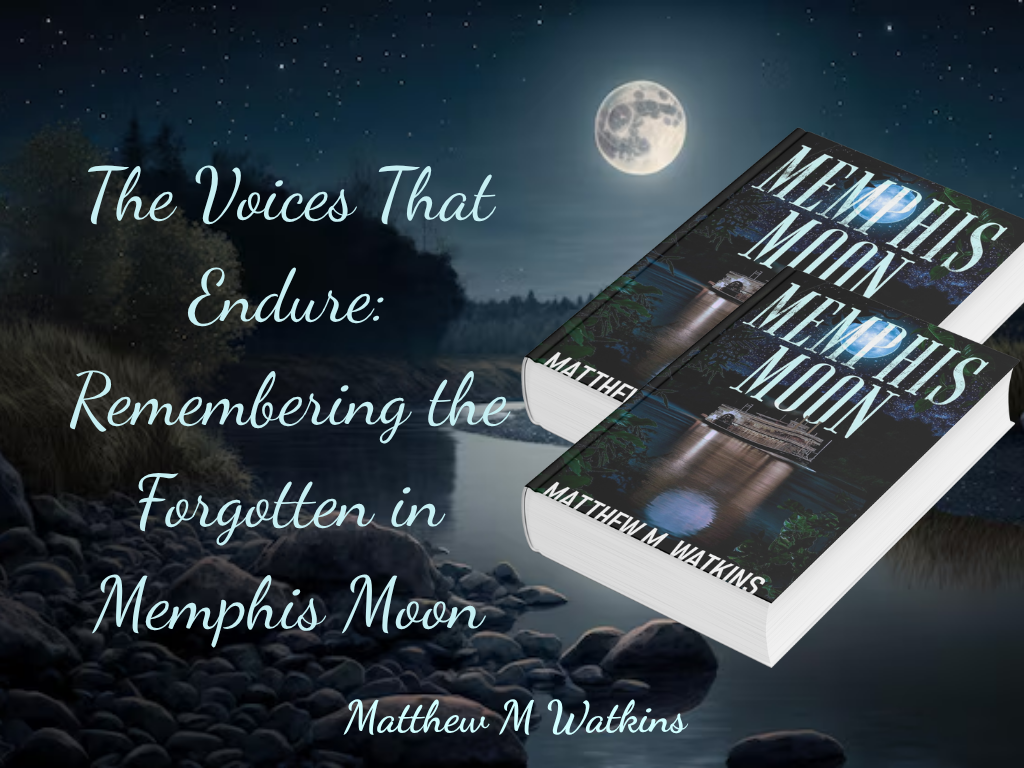At its heart, Matthew M. Watkins Memphis Moon is an act of remembrance, a literary resurrection of voices that history almost left behind. Across its pages, Watkins gathers the fragments of forgotten lives and gives them back their sound. Through Ginnie Moon, Lottie Moon, Caleb Dawkins, and the unnamed modern writer who uncovers their story, he shows how storytelling itself becomes an act of recovery, a way of returning dignity, love, and meaning to those whose names faded long ago.
The novel begins with discovery, a diary, sealed behind plaster, unearthed by chance. When the modern timelines writer finds Ginnie’s journal, she gets access to another timeline entirely, an entirely different life, a different being, and a different set of emotions. We witness the range of emotions Ginnie undergoes through her delicate handwriting, the fragile paper, and the smudges of ink. Matthew M. Watkins makes the readers imagine the stories that are still waiting to be heard, stories of all the other people of that time, workers, women, dreamers, and believers who shaped the past quietly.
In the press release and feature article, Watkins described his fascination with Ginnie and Lottie Moon as a kind of calling, not to rewrite history, but to re-listen to it. These sisters, real figures from the nineteenth century, lived in the tension between duty and defiance. One used her intellect and charm as a spy; the other, her compassion and faith as a missionary. Yet what drew Watkins most wasn’t their historical fame, but their humanity, their courage to live meaningfully in times that did not see them fully.
Memphis Moon becomes his tribute to them and to all the unseen lives of their world. The Civil War has been told countless times, but rarely through such intimate eyes, through people whose struggles were private, spiritual, and enduring. Watkins reclaims the small stories: the way a letter was folded, the rhythm of prayer in a quiet kitchen, the mill rebuilt in a broken town. In these details, he restores the texture of ordinary heroism.
Caleb Dawkins, too, becomes a recovered voice, the everyman whose grief and rebuilding embody a generation’s struggle to survive. Through him, Watkins reminds readers that the war’s aftermath was not only written by leaders and soldiers, but by those who stayed to mend the torn earth. When the modern writer opens that diary, she becomes the witness Ginnie hoped for. Through this act of rediscovery, Watkins builds a bridge across time: one woman’s truth reaching into another’s heart, both changed by the exchange.
That bridge is where the novel’s moral power lies. Watkins doesn’t frame remembrance as nostalgia, but as responsibility. To remember is to heal. To listen is to honor. Memphis Moon reminds us that history is never complete until its quietest participants are allowed to speak. The author’s empathy transforms research into resurrection, giving voice to the people history recorded only in passing.
Even the book’s title feels like a memorial. The “moon” in Memphis Moon is not only a celestial image; it’s a metaphor for endurance, the same light rising above centuries, witnessing the same human emotions repeating in different forms. Watkins’s choice of tone, reflective, lyrical, and compassionate, allows those echoes to reach the reader’s soul without fanfare. He trusts silence as much as sound, presence as much as prose.
By the end of Memphis Moon, the reader understands that every rediscovered story is also a redemption. The act of remembering becomes an act of love. Watkins’s characters, and Watkins himself, remind us that we are all custodians of someone else’s memory. When we tell their stories, we restore them to life.
Through this quiet, generous vision, Watkins achieves something rare: he turns fiction into remembrance and remembrance into renewal. Memphis Moon doesn’t just revive its characters; it teaches us how to listen for the voices still waiting behind the walls of time.
In doing so, Matthew M. Watkins leaves readers with one enduring truth: that nothing is ever truly lost if it is remembered with empathy. The forgotten are only waiting to be found, and when we find them, we find ourselves.

